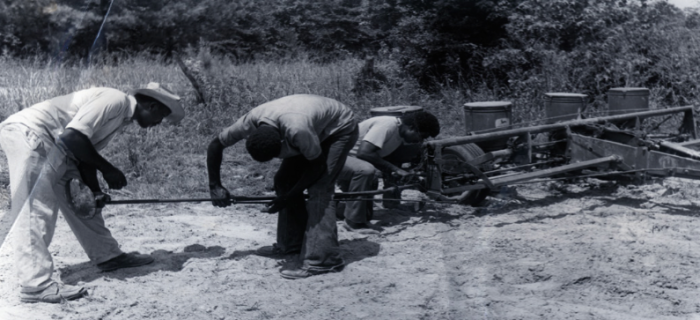Black Agrarianism: Resistance
The following is the sixth installment in our Dismantling Racism in the Food System series, and is from 2017’s forthcoming book Land Justice: Re-imagining Land, Food, and the Commons. Click here to download this Backgrounder in full. To view this Backgrounder in Spanish click here, French here, and Portuguese here.
“If you ever find
yourself, some where
lost and surrounded
by enemies
who won’t let you
speak in your own language
who destroy your statues
& instruments, who ban
your oom boom ba boom
then you are in trouble
deep trouble
they ban your
oom boom ba boom
you in deep deep
trouble
humph!
probably take you several hundred years to get
out!”
-Amiri Baraka
In 1803, seventy-five captured Igbos seized control of a ship headed to St. Simons Island, Georgia, forcing the white abductors to jump overboard and drown. According to archival evidence, upon arrival on the shores of the island, the Igbos marched together into the creek chanting, “The Water Spirit Omambala brought us here. The Water Spirit Omambala will carry us home.” This act of resistance became one of the most heralded examples in the United States of enslaved Africans using mass suicide to free themselves from chattel slavery. The Igbos who resisted slavery through communal death and transcendence were canonized as the “Flying Africans” centuries later in Gullah Geechee and African American folklore. Through African oral tradition and collective memory, the Igbos metamorphosed into supernatural birds that soared above slavery and cultural annihilation.
Though the Igbos resisted slavery through death, millions of African descendants resisted slavery through life, ensuring the transference of oom boom ba boom (ancestral knowledge, regenerative ideologies, and agrarian lifeways) to future generations in efforts to repel the permutations of white supremacist capitalism.
This backgrounder pays homage to the “Flying Africans” of the Black agrarian liberation movement(s) in the United States—our collective triumphs, defeats, and rebirths. The incessant racialized extrajudicial killings of Black men, women, and children are chilling reminders that African descendants are without sanctuary in this country. Our ancestors understood this solemn truth, dug into the dirt, and built autonomous agrarian villages “for the beautiful ones not yet born.” As Ella Jo Baker shared with the beloved community, “The struggle is eternal. The tribe increases. Somebody else carries on.”
Click here to download this Backgrounder, or view in full below.
Stay in the loop with Food First!
Get our independent analysis, research, and other publications you care about to your inbox for free!
Sign up today!DR6_final-3


 Help Food First to continue growing an informed, transformative, and flourishing food movement.
Help Food First to continue growing an informed, transformative, and flourishing food movement.




